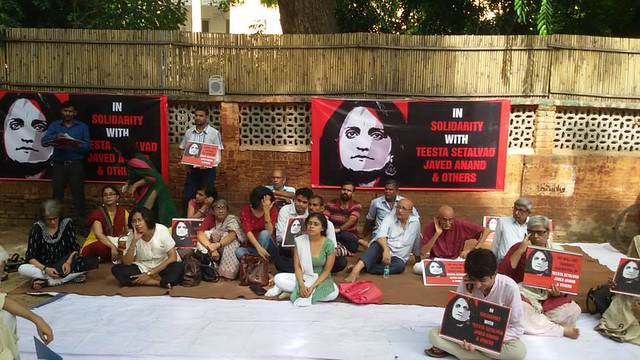
In India, Narendra Modi’s government is going to extraordinary lengths to silence and crush social justice activist Teesta Setalvad. While the Indian press has taken up the story, the world press, with the exception of Reuters, has chosen to look the other way. Teesta Setalvad has refused to look the other way, and that’s why she’s in trouble.
In February 2002 “intercommunal” violence erupted in the Indian state of Gujarat. Within a week, over 1000 Muslims had been killed. From the outset, Teesta Setalvad fixed everyone’s eyes on the violence and then on the State’s role in the intensity and expanse of that violence. Narendra Modi was Chief Minister of Gujarat at the time.
While the Modi administration was trying to “explain” the violence as communal, Teesta Setalvad wrote, in 2002, “Despite the fact that the minority community was being attacked by huge and well-armed mobs, Muslims seemed to have been the main target of police firing. Of the 40 people killed in police firing at Morarji Chowk and Charodia Chowk in Ahmedabad on 28 February all were Muslim.”
Women and children were targeted with extreme sexual violence and other forms of torture. Again, Teesta Setalvad immediately made sure everyone understood the police participation in this, “Women bore the brunt of police repression. They were subjected to verbal abuse of a highly sexualized nature and often mercilessly beaten. Even pregnant women were brutally beaten; indeed they seemed to have attracted special attention from the police, and in many cases, the beating was accompanied by statements such as `Let it die before it is born’.”
Teesta Setalvad insisted that the facts must first be determined and then adjudicated. She headed the Concerned Citizens Tribunal, which investigated the entire situation, including the initial incidents, and found rampant and systematic violence against women and girls. The Tribunal worked assiduously and at the end of 2002 released its three volume findings, Crime Against Humanity.
Teesta Setalvad then founded the magazine Communalism Combat; the ngo Citizens for Justice and Peace; and the human rights organization Sabrang, and kept the focus on the State’s guilt in the Gujarat pogroms. In 2012, 32 people, including a former state minister, of involvement in the violence. Teesta Setalvad responded, “For the first time, this judgment actually goes beyond neighborhood perpetrators and goes up to the political conspiracy. The fact that convictions have gone that high means the conspiracy charge has been accepted and the political influencing of the mobs has been accepted by the judge. This is a huge victory for justice.”
In April 2015, the Modi national government placed the Ford Foundation on a national security watch list, because of its funding the Sabrang Trust. The State accused Teesta Setalvad of “disturbing the communal harmony here and carrying out anti-national propaganda against India in foreign countries.”
On July 15, the police raided Teesta Setalvad’s home and offices. Many view this shameful hounding as a concerted campaign of intimidation and suppression. Teesta Setalvad’s response to the most recent assaults shows the power of the pursuit of justice: “Despite being agnostic, we do sometimes believe in miracles. Through the work we have committed our lives to … I have believed in the purity of motive and the sincerity of faith …The struggle for justice for the victims of the Gujarat riots has validated this belief. It has been awe-inspiring to watch the raw courage of witness survivors – firm in the belief that truth is on their side – testifying before the courts. It is their audacity that has led to the life imprisonment of 120 people. The fact that they stood with us, and we with them, has made them unflinchingly loyal to us. Even in these hours when state vendetta has been unleashed upon us, they are praying for us.”
Teesta Setalvad has steadfastly refused to look the other way. She argues for the miracle of solidarity and the necessity for justice. Do not let the world look the other way. Stand with Teesta Setalvad, firm in the belief in the audacity and miracle of women’s justice.

(Photo Credit: twocircles.net) (Image Credit: The Indian Express)
.jpg) President Barack Obama went to India last week.
President Barack Obama went to India last week.